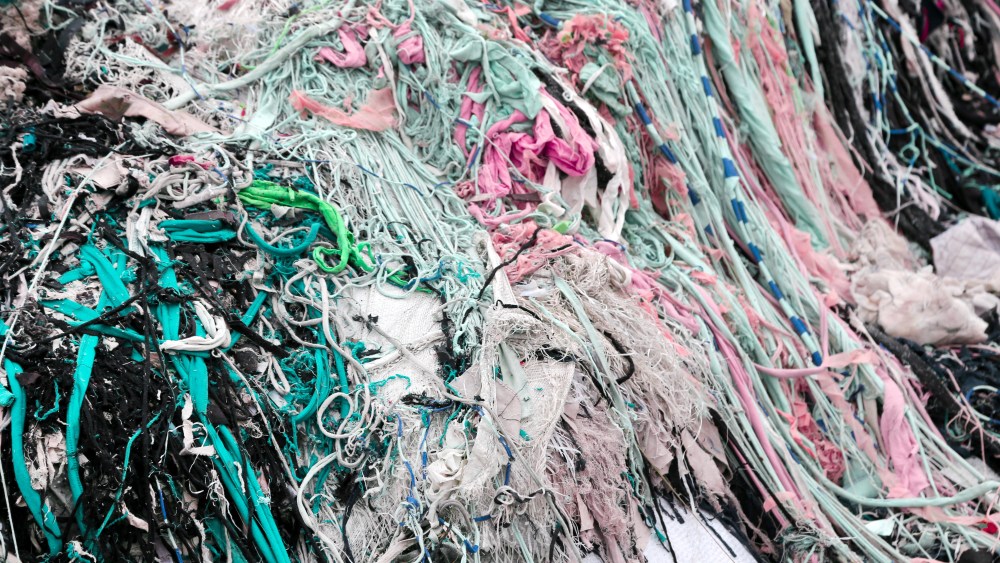MILAN — Over the past 10-plus years, the textile and fashion industries have been pressured to take significant steps toward sustainability by consumers, policymakers and the general public alike.
They have indeed made quantum leaps in adopting an eco-mindset that spans chemicals, operations, processes and logistics, although this has often been confined to players in the high-end and luxury spaces, leaving the bulk of textile and apparel manufacturing behind.
Viewed as a key competitive business advantage, when not integral to the sector’s survival toolkit at a time of continued supply chain disruptions caused by geopolotical turmoil and economic headwinds, sustainability and traceability require constant investments to fuel innovation.
The latter is often spurred by out-of-the-box thinkers and entrepreneurs driving change, some of which are behind the five fashiontech start-ups selected by WWD here.
You May Also Like
Haelixa
Claiming that chain of custody standards, a record of all steps in the supply chain, are far from enough to ensure a reliable set of traceability information, Haelixa offers a DNA-based solution.
Established in 2016 by cofounders Gediminas Mikutis, also chief technology officer, and Michela Puddu, also advisory board member, the start-up aims to minimize fashion and textile companies’ exposure to the vulnerability of standards and certifications by introducing a physical and tangible verification system.
Haelixa’s solution applies DNA markers on fibers after the ginning procedure, providing them with a traceable identity and verifying the origin of intermediate or finished products, thus ensuring companies’ claims on, say, the use of organic cotton or recycled fibers are validated.

A unique DNA code per location and fiber type is designed and the marker containing it — compliant with the GOTs, Oeko-Tex and Eco Passport standards — is sprayed onto the fibers. Forensic tests are conducted by independent labs and information — also known as verification certificates — shared with companies or uploaded onto digital traceability interfaces and tools.
Adding a DNA marker in the early stages ensures all steps through the supply chain are automatically verified for traceability. This mitigates risks connected with material substitutions and the use fake textiles by subsuppliers, in addition to easing custom clearance and avoiding import bans.
The company says that the use of its solution has the most impact on textiles for which false claims are more frequent, including recycled fibers, cotton, cashmere and alpaca wool. It also unlocks the traceability of fibers currently not covered by other available standards, including hemp, nettle or banana fibers, for example.
Peftrust
Implementing eco-design principles and conducting life cycle assessments across multiple products and product categories can become a headache.
Aiming to ease and speed the sustainability-oriented, decision-making process for fashion companies, as well as to scale up eco-minded efforts, the one-platform tech solution Peftrust automates sustainability and supply chain data across stock keeping units, categories and formats.
Established in Metz, France, in 2021 by cofounders Laurent Bocahut and Mélinda Dubreucq, chief executive officer and chief operating officer, respectively, the start-up allows bulk data uploads on the platform, with entire collections’ skus and supplier datasets quickly available for an instant mapping of all steps in product creation.

This favors eco-design decision-making with scalable impact, helping companies to identify hot spots and areas of improvement, simulate eco-design pilots as well as to track and tackle Scope 3 GHG emissions. Its output data — supporting traceability and transparency — are designed for seamless integration in the Digital Product Passport.
Peftrust counts on a vast network of partners, including Product Lifecycle Management and traceability platforms, suppliers and policy makers.
Cloov
A three-in-one white label solution geared at circularity in fashion, Cloov was launched to meet demand for resale, rental and repair driven by Gen Z and Millennial customers alike.
The software aims to tap into the under-exploited opportunity for brands to reclaim ownership of their products’ life cycle by resorting to circular business models, and turn them into strategic business levers, while aiming to ensure seamless integration and alignment with any given brand’s identity.
Established in 2022 by cofounders Chiara Airoldi and Olimpia Santella, the business-to-business solution provides new means to manage unsold, returned or past-season inventory, beyond discounts, wasteful disposal or garment recycling processes.
The end-to-end solution aims to help brands build and scale a circular offering.

For resale, it works as a tech infrastructure enabler building resale platforms from scratch, handling the resale shopping process down to the automated connections with logistics partners.
For repair, it connects brands and repair shops via a collaborative tech tool aimed at streamlining the process by allowing an anticipated configuration of repair details — as in which products and how they get repaired — as well as pricing.
For rental, the white-label tech solution allows the launch and management of the service, with real-time tracking of product availability and automated coordination of item returns, reconditioning and redistribution.
CDC Studio
As European policymakers inch closer to issuing regulations on the mandatory implementation of eco-design principles to foster better textile and apparel recycling, CDC Studio hopes to come to the rescue with an alternative approach.
The start-up founded in 2020 by Cristina Di Carlo and Matteo Corbellini, CEO and chief technology officer, respectively, boasts the patented proprietary solution Miktòs geared at the management of textile waste, which is turned into raw material alternative to virgin or recycled plastics.
The patented technology allows brands to turn both single- and mixed-fiber textile waste into a granular plastic-like compound applicable across fashion, design, packaging, automotive and construction for potential use in the manufacturing of buttons, heels, outsoles, hangers and more. The Miktòs compound is also fully and infinitely recyclable.

The CDC Studio hub, based outside Pisa, Italy, sources end-of-life products by partnering with dedicated not-for-profit organizations and handles the transformation. The compound is then sold back to the companies which originally generated the waste or to third parties.
The solution is seen as helping textile and fashion companies’ compliance with several to-be-implemented regulations, including the EU’s Extended Producer Responsibility, which sets accountability terms on fabric-makers and fashion brands for textile waste, as well as with the Packaging and Packaging Waste Regulation legislation, which requires a critical reduction of virgin plastic use for packaging.
Earlier this year, the company closed an investment round of 380,000 euros spearheaded by Styleit — a fashiontech accelerator promoted by CDP Venture Capital SGR, Startupbootcamp and Gellify — and the Fondazione Social Venture Giordano Dell’Amore.
In addition to Miktòs, CDC Studio has developed a second solution called Cōēo. The latter is a coating compound produced starting from post-consumer recycled plastic packaging which is to be used as a finishing treatment on unsold or flawed textiles and leather products. The coating provides water- and windproof qualities, in addition to enhancing the products’ durability. Products coated with Cōēo can be recycled by CDC Studio and turned into slabs suitable for flooring and design objects.
Movopack
The EU’s Packaging and Packaging Waste Regulation framework requires that 40 percent of e-commerce packaging is reusable by 2030, spotlighting one of the often-neglected aspects across the fashion supply chain.
Founded in 2020 by Tommaso Torriani, Andrea Cipollone and Alberto Cisco, CEO, chief operating officer and chief commercial officer, respectively, Movopack, is offering a solution to comply with the regulation providing a wide range of reusable packaging products and handling reverse logistics to collect them and give them new life.
Customers receiving their e-commerce purchases in a Movopack package can mail them back via one of the 700,000 mailboxes spread across Europe. The start-up company sorts, cleans and refurbishes the package and puts it back into the market for the next round of usage.

The company claims that each cycle of 20 reuses entails a 98 percent reduction in waste compared to the already greener use of disposable cardboard with 70 percent of recycled content. The Movopack system also claims to cut carbon dioxide emissions by 84 percent and 76 percent of water usage.
In 2024 Movopack secured a 2.3 million euro funding round from leading venture capital investors, which has allowed it to expand in the U.K. The company already counts such brands as Save the Duck, sports retailer Dechatlon, innerwear and swimwear brand Yamamay, as well as OTB Group’s kidswear division Brave Kid, among its clients.



